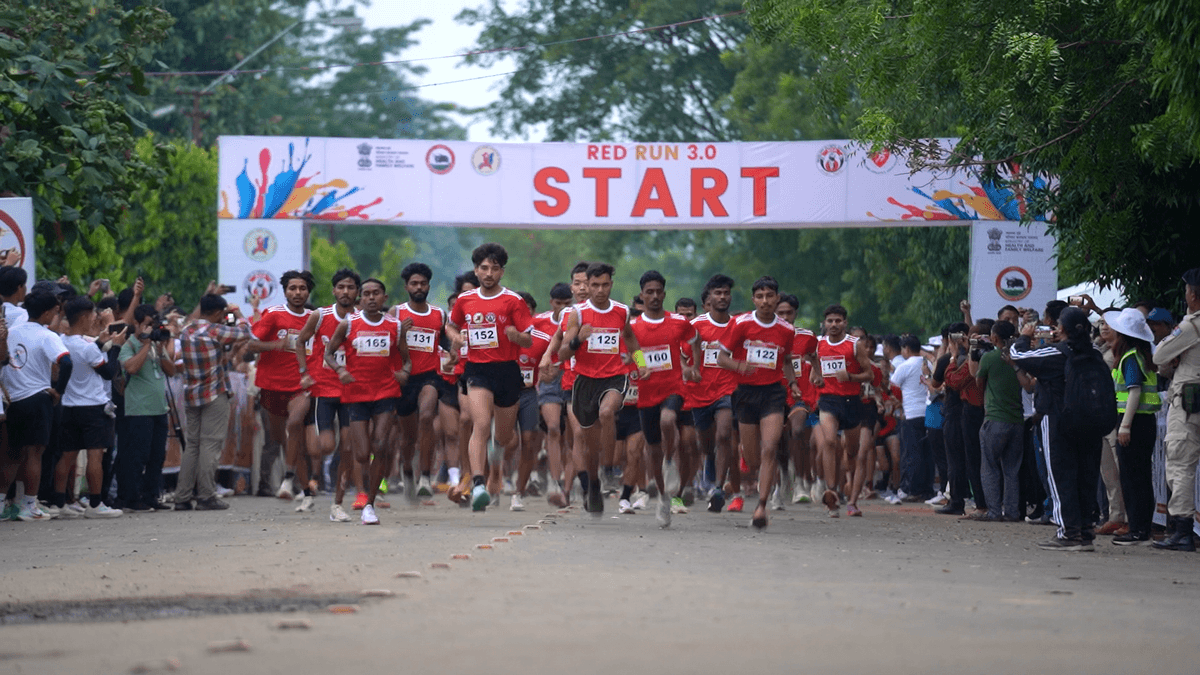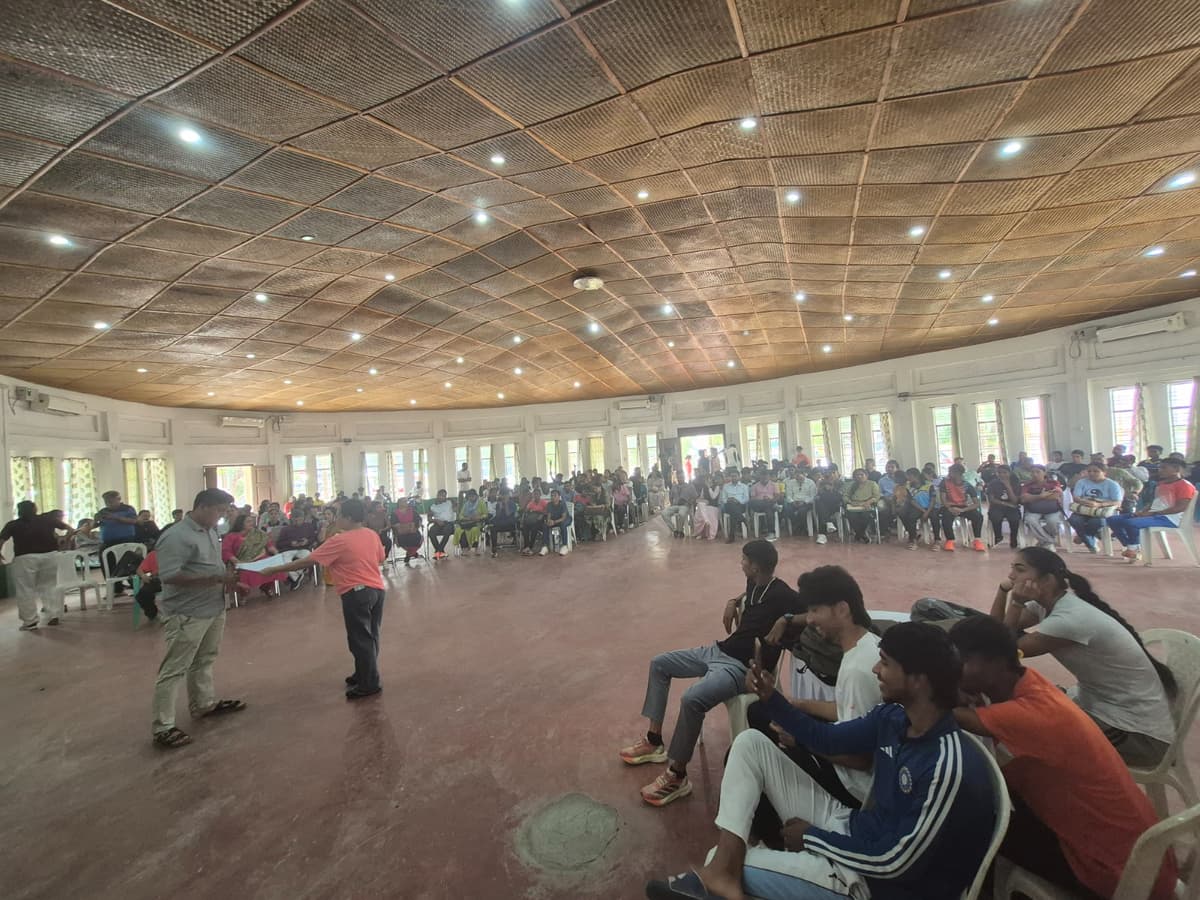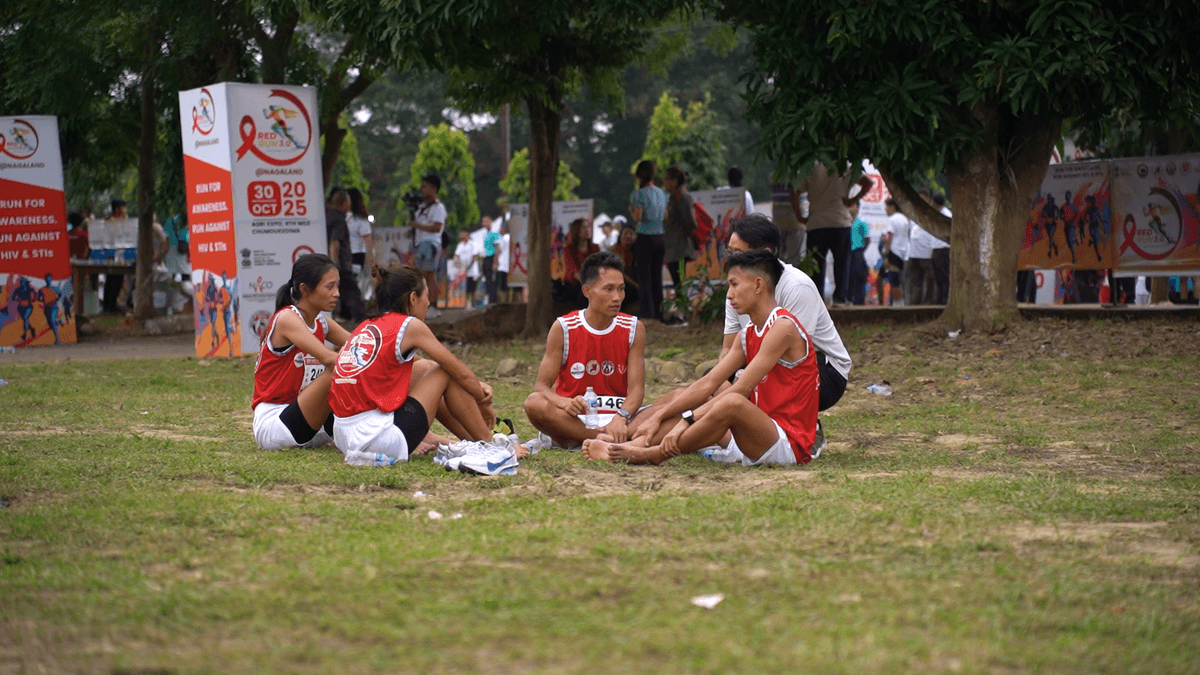Red Run 3.0 in Nagaland brought together participants from 35 states and Union Territories to promote unity and raise awareness for an HIV stigma-free India.
Share

DIMAPUR — The Red Run 3.0, hosted by Nagaland, brought together participants from 35 states and Union Territories in a powerful show of unity, awareness, and collective resolve towards creating an HIV stigma-free India. Far more than a marathon, the event became a symbol of solidarity and shared purpose.
Organised by the Nagaland State AIDS Control Society (NSACS) in collaboration with the Nagaland Olympic Association (NOA) and the Nagaland Athletics Association (NAA), the event was supported by the National AIDS Control Organisation (NACO) under the Ministry of Health and Family Welfare, Government of India.
For the NSACS, hosting over 200 participants from across the country — along with more than 700 from Nagaland — was a major logistical challenge that tested its planning, coordination, and execution capabilities.
NSACS Project Director, Dr. Ahu Sekhose, acknowledged that despite the state’s limited infrastructure, the event had been a valuable learning experience. “Along with all stakeholders, the team gained valuable experience in hosting Red Run 3.0, making it a successful event,” he said.
Also read: Panchanan Bera, Anisha win 10 km competitive categories at Red Run 3.0 in Chümoukedima
Previously held in Goa, Red Run 1.0 and 2.0 had set the stage for the event’s expansion. The third edition, held at the Agri Expo site in Chümoukedima, featured a 10 km competitive run for state-level champions and a 2 km general run for the public, including a solidarity segment that brought together people from all walks of life. Preceded by state and district-level qualifying runs, the event united top athletes who now serve as national ambassadors for HIV awareness.
The run’s success was the result of extensive collaboration — involving NACO, NSACS, NOA, NAA, traffic police, college volunteers serving as marshals, and local influencers and content creators who amplified the message of inclusion and awareness across digital platforms.

Journey to reduce stigma
At its core, the Red Run sought to challenge stigma, spread accurate information about HIV and sexually transmitted infections (STIs), and advocate for the dignity and rights of those living with HIV. The initiative aimed to empower youth with knowledge, promote healthy lifestyles, and strengthen partnerships between government bodies, NGOs, and the public.
The event’s digital outreach was particularly impactful, as content creators promoted messages on testing, prevention, and acceptance — drawing praise from participating State AIDS Control Societies for Nagaland’s strong organisation.
Teams from across the country lauded the event’s seamless execution and the warmth of their Nagaland hosts. The Goa contingent, which had organised the first two editions, described Red Run 3.0 as “well arranged” and commended Nagaland’s efforts to adapt the event to a very different setting. “It’s a different setup, different culture, but they’ve done a great job organising this event,” they said.

The Assam State AIDS Control Society team also described Red Run 3.0 as a “great success,” noting that participants not only competed but also gained valuable knowledge about HIV, AIDS, and STIs. “All arrangements, from food to logistics, were perfect,” they said, expressing appreciation for the organisers and adding that they wished they could have stayed longer but had to return due to official duties.
The team from Ladakh shared that their experience was “great,” emphasising the Red Run’s importance in raising awareness among youth, who remain one of the most vulnerable groups in the country. They said the event was a “powerful message of unity in diversity,” giving them an opportunity to learn about Nagaland’s culture, food, and topography while also connecting with other participants from across India.
The Telangana team, equally impressed, remarked, “It was great from the moment we landed till the end of our participation. Nagaland is a different world! We’re planning to come back. We wish we could have stayed longer.”
Strength in unity
Abu Metha, Vice President of the Athletics Federation of India and Secretary General of NOA, described the event as a milestone for Nagaland. “This event, organised by NACO and the state AIDS control societies, united athletes and participants from every state and UT,” he said, expressing gratitude to the Ministry of Health and NACO for choosing Nagaland as the host.
“We’re proud to have implemented this initiative with NOA and NAA,” he added.
WATCH MORE:
Metha emphasised that the event met national and international athletic standards, with each runner’s bib embedded with a chip to ensure precision timing. The Red Run was also live-streamed, allowing people across the country to witness the event in real time.
“The Red Run’s focus is twofold — raising AIDS awareness and meeting strict technical standards,” Metha said. Technical officials from Nagaland Athletics, certified by the Athletics Federation of India, oversaw the competition in accordance with ministry guidelines.
Dr. Sekhose, meanwhile, expressed gratitude for the opportunity to host the event, describing it as “a national affair with 140 participants from most states across the country.”
Learning through engagement
Following the run, the Red Ribbon Quiz competition was organised by NSACS and NACO on October 31, engaging students between the ages of 13 and 17 from classes 8, 9, and 11 across government-aided and private schools.
The quiz, which progressed from school to national level, aimed to impart comprehensive knowledge on HIV and STIs, provide an interactive learning platform on health and well-being, and address issues related to reproductive health, nutrition, hygiene, and lifestyle. It also sought to dispel myths and social taboos while reducing stigma and discrimination.
The Telangana team, which emerged as the winner of the national-level quiz competition, used the opportunity to encourage youth to become advocates for awareness. Through the media, they urged young people to “spread awareness about HIV&AIDS, educate families and communities that HIV isn’t a disease to be feared,” and to “treat everyone with kindness and respect.”
They emphasised that compassion and understanding were key to building an AIDS-free India and reaffirmed their commitment to promoting HIV awareness and reducing stigma.
The initiative aimed to empower young people with accurate information and inspire them to lead healthy, responsible, and stigma-free lives.